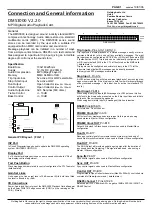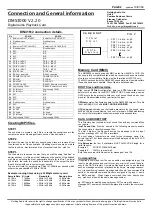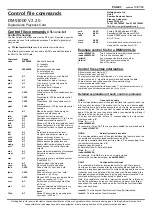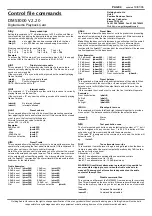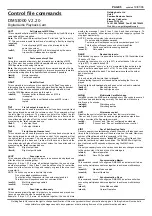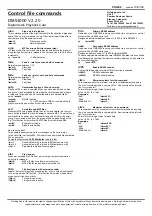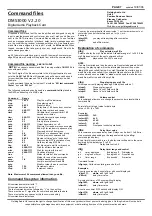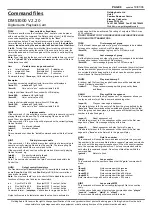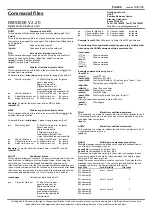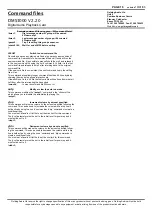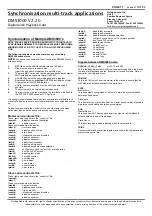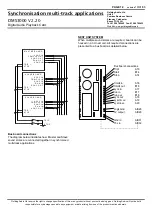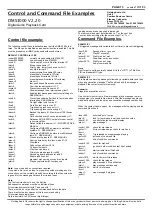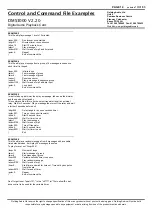
PAGE 11
updated
19/01/06
Syncronisation of Multiple DMS3000’s
NOTE. PLEASE ADVISE GOLDING AUDIO LTD IF YOU INTEND TO
SYNCHRONISE DMS3000’S TOGETHER AS WE MUST PERFORM A
MINOR MODIFICATION TO THE PCB TO ALLOW SYNCHRONISA-
TION.
The following conditions must be met when synchronising
DMS3000 sound stores.
NOTE:
You cannot use command files if running the DMS3000 in sync
with each other.
1:
MP3 files must be 48KHz sample rate and 192 Kbps.
2:
Files must be exactly the same size.
(right click and check properties for exact file size)
3:
The slave MMC cards must be the same capacity as the master
MMC card and be the same format (fat12/16).
4:
All DMS3000’s must be powered up and down together.
5:
Boards used must be
modified
DMS3000 iss4 boards or later.
6:
Trip must be at least 250mS duration.
7:
All inter board connections must be short and screened if
possible.
8:
The sysclk must be a twisted pair between units.
9:
The last slave on the run must have the termination link fitted to
the SYSCLK RS485 receiver. JP4 right pins.
It is strongly recommended that multi-track systems are built within rack
mount card frames to ensure short cable lengths and synchronized power
up.
Certain functions within the ‘control.txt’ file on both master and slave
cards must also be set as active or inactive as outlined below:
Master card control.txt file.
These items must be active in the “control.txt” file.
/ncmd=1;
disable command file search
/mast=1;
enable master
These commands must be inactive.
/slav=0;
Not slave mode
/osbe=0;
disable one shot trips
/nbuf=0;
allow flush
/cont=0;
interrupted continue disabled
/scn1=0;
disable sequencer
/scnc=0;
disable sequencer
/fast=0;
disable fast interrupts
/self=0;
disable self interrupts
/bank=0;
disable banked message selection
/actl=0;
configure sync and run out to normal operation
/sfat=0;
don’t save FAT entries
/pian=0;
disable piano mode
/r485=0;
no rs485 control
/wdog=0;
no watchdog
/16tp=0;
no multitrips
/autp=0;
no auto play
/scrl=0;
no scroll mode
/plal=0;
no auto loop
Slave cards control.txt file.
These items must be active in the “control.txt” file.
/ncmd=1;
/slav=1;
These commands must be inactive
/mast=0;
no master mode
/osbe=0;
disable one shot trips
/nbuf=0;
trip inputs N/O
/cont=0;
interrupted continue disabled
/scn1=0;
disable sequencer
/scnc=0;
disable sequencer
/fast=0;
disable fast interrupts
/self=0;
disable self interrupts
/bank=0;
disable banked message selection
/actl=0;
configure sync and run out to normal operation
/sfat=0;
don’t save FAT entries
/pian=0;
disable piano mode
/r485=0;
no rs485 control
/wdog=0;
no watchdog
/16tp=0;
no multitrips
/autp=0;
no auto play
/scrl=0;
no scroll mode
/plal=0;
no auto loop
Signals between DMS3000 units.
SYSCLK
(RS485) 10Mhz
pins A19 and A20
This is the decoder system clock from the master supplied to the slaves
to prevent drift between boards. Essential for looped systems. Not es-
sential for short tripped syncs
FRMCLK
This is a 41.6Hz clock from the master to the slaves to ensure that the
mp3 files are all started at exactly the same time.
SYNC
Master card
This line outputs sync pulses at intervals to maintain synchronisation
between sound stores.
Slave card
This line receives sync pulses from the master sound card at intervals to
maintain synchronisation between sound stores.
RUN
Master Run out
This line goes low 1 frame before audio is output to tell the slaves to
output audio on the next frame edge.
Slave Run in
This input receives a pulse indicating when to output audio.
TRIPS
Connect master and slave trips together and ensure the trip parameters
match in the control file.
Synchronisation multi-track applications
DMS3000 V2.20
Digital Audio Playback Card
Golding Audio Ltd
Unit 8
Peartree Business Centre
Stanway Colchester
Essex CO3 0JN
Tel: 01206 762462 Fax: 01206 762633
Web Site: www.goldingaudio.co.uk
Golding Audio Ltd reserve the right to change specification of this or any product without prior notice being given. Golding Audio will not be held
responsible for any damage caused to any equipment or data, arising from use of the product mentioned herein.

